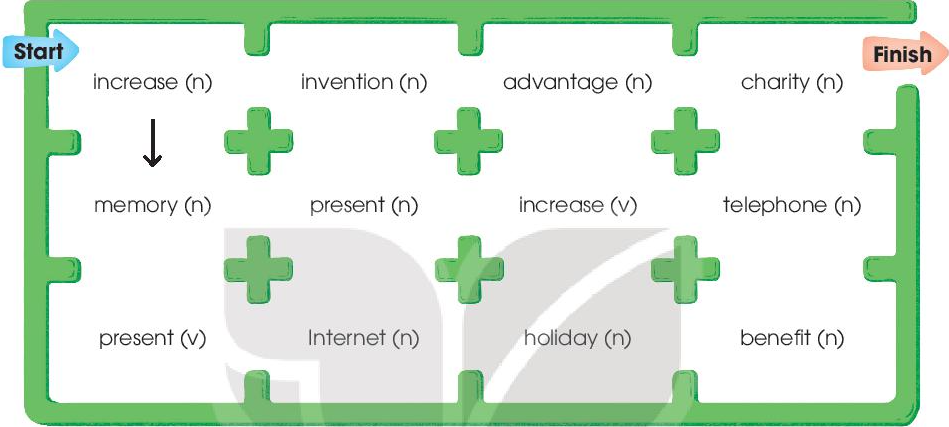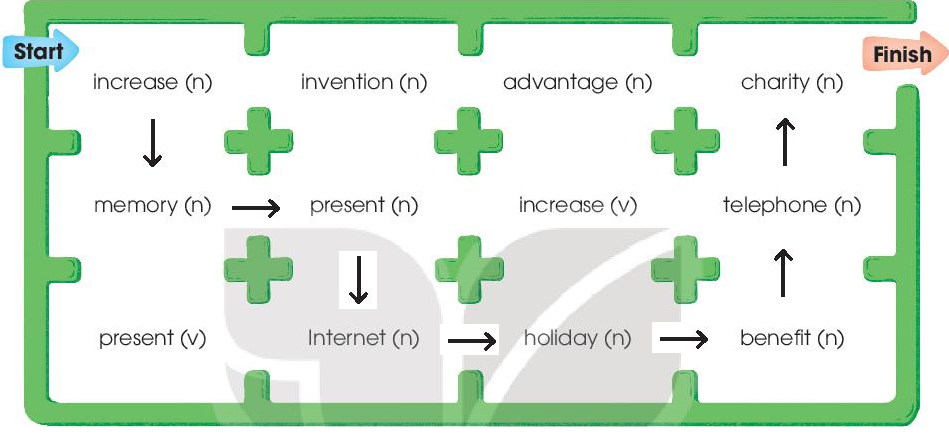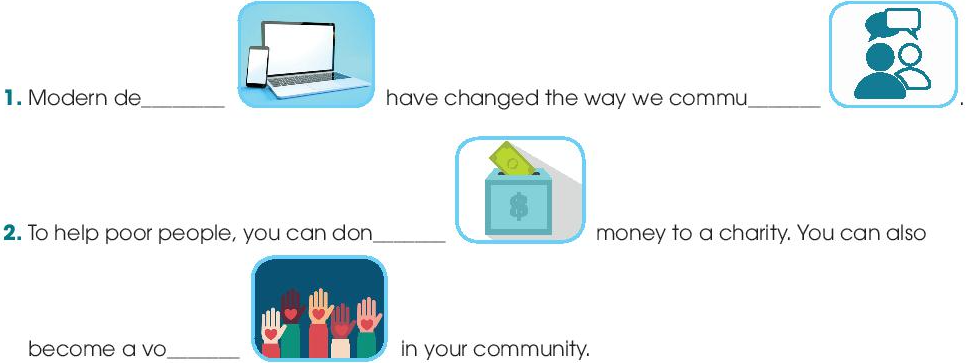Tiếng Anh 10 Review 2 LanguageEscape the maze by connecting all the words with stress on the FIRST syllable. Follow the example. Then listen to check your answers. Practise saying the words. 1. What are the missing letters? Complete the sentences using the pictures to help you. The first word is done for you. 2. Complete the sentences using these words. There are some extra ones. Read the text and circle the correct answers. Quảng cáo
Lựa chọn câu để xem lời giải nhanh hơn
Pronunciation Video hướng dẫn giải Escape the maze by connecting all the words with stress on the FIRST syllable. Follow the example. Then listen to check your answers. Practise saying the words. (Thoát khỏi mê cung bằng cách kết nối các từ với các từ có trọng âm ở âm tiết thứ nhất. Làm theo ví dụ. Sau đó nghe để kiểm tra câu trả lời của em. Thực hành đọc các từ.)
Phương pháp giải: increase /'ɪnkriːs/ (n): sự gia tăng => trọng âm 1 present /prɪˈzent/ (v): thuyết trình => trọng âm 2 memory /ˈmeməri/ (n): trí nhớ => trọng âm 1 invention /ɪnˈvenʃn/ (n): sự phát minh => trọng âm 2 present /ˈpreznt/ (n): món quà/ hiện tại => trọng âm 1 Internet /ˈɪntənet/ (n): mạng => trọng âm 1 advantage /ədˈvɑːntɪdʒ/ (n): lợi ích => trọng âm 1 increase /ɪnˈkriːs/ (v): gia tăng => trọng âm 2 holiday /ˈhɒlədeɪ/ (n): kì nghỉ => trọng âm 1 charity /ˈʧærɪti/ (n): từ thiện => trọng âm 1 telephone /ˈtɛlɪfəʊn/ (n): điện thoại => trọng âm 1 benefit /ˈbɛnɪfɪt/ (n): lợi ích => trọng âm 1 Lời giải chi tiết:
Vocabulary 1 Video hướng dẫn giải 1. What are the missing letters? Complete the sentences using the pictures to help you. The first word is done for you. (Những chữ cái còn thiếu là gì? Hoàn thành các câu bằng cách sử dụng các hình ảnh để giúp bạn. Từ đầu tiên được thực hiện sẵn cho bạn.) Example: Smartphones allow us to get access to the Internet anywhere. (Điện thoại thông minh cho phép chúng ta truy cập Internet ở mọi nơi.)
Lời giải chi tiết: 1. Modern devices have changed the way we communicate. (Các thiết bị hiện đại đã thay đổi cách chúng ta giao tiếp.) 2. To help poor people, you can donate money to a charity. You can also become a volunteer in your community. (Để giúp đỡ những người nghèo, bạn có thể quyên góp tiền cho một tổ chức từ thiện. Bạn cũng có thể trở thành tình nguyện viên trong cộng đồng của mình.) Vocabulary 2 Video hướng dẫn giải 2. Complete the sentences using these words. There are some extra ones. (Hoàn thành các câu bằng cách sử dụng những từ này. Có một số từ thừa.)
1. Many__________inventions in the world are the results of hard work and _________experiments. 2. Things such as old clothes or toys seem ________, but you can donate them to charity. Some poor people may be ______ in them. Phương pháp giải: useful (adj): có ích >< useless (adj): vô ích interested (adj): hứng thú interesting (adj): thú vị careful (adj): cẩn thận >< careless (adj): bất cẩn Lời giải chi tiết: 1. useful – careful Many useful inventions in the world are the results of hard work and careful experiments. (Nhiều phát minh hữu ích trên thế giới là kết quả của những thử nghiệm chăm chỉ và cẩn thận.) 2. useless - interested Things such as old clothes or toys seem useless, but you can donate them to charity. Some poor people may be interested in them. (Những thứ như quần áo cũ hoặc đồ chơi tưởng chừng như vô dụng, nhưng bạn có thể quyên góp chúng cho tổ chức từ thiện. Một số người nghèo có thể quan tâm đến chúng.) Grammar Video hướng dẫn giải Read the text and circle the correct answers. (Đọc văn bản và khoanh tròn các câu trả lời đúng.) Inventions and discoveries by accident! The invention or discovery of something is not always the result of careful experiments. Sometimes, luck can help scientists (1) finding /find new things. Below are some famous examples. Gravity: (2) Discover / Discovering the law of gravity is probably the most famous example. Isaac Newton (3) sat / was sitting under an apple tree when an apple (4) fell/ was falling on his head. He realised that something made apples fall straight to the ground. That was gravity! Penicillin: Alexander Fleming came back from his holiday. He (5) was cleaning / cleaned his laboratory when he (6) discovered / was discovering something at the window. That was penicillin! Since then, doctors (7) used / have used penicillin around the world to save millions of lives Popsicles: In 1905, 11-year-old Frank Epperson decided (8) to make / making himself a soft drink. When he finished (9) make / making the drink, he left it outside with the wooden stick inside it. That night, the drink froze in cold weather and thanks to this 'accident', popsicles were later invented! Lời giải chi tiết:
Giải thích: (1) help O + V nguyên thể: giúp ai làm gì => find (2) Danh động từ (Ving) đứng đầu câu làm chủ ngữ => Discovering (3), (4) When + S + Ved (QKĐ), S + was/ were + Ving (đang làm gì thì có hành động xen vào) => was sitting – fell (5), (6) When + S + Ved (QKĐ), S + was/ were + Ving (đang làm gì thì có hành động xen vào) => was cleaning –discovered (7) since then (kể từ đó) là dấu hiệu thì hiện tại hoàn thành => have used (8) decide to V: quyết định làm gì => to make (9) finish + Ving: hoàn thành việc gì => making Bài đọc hoàn chỉnh: Inventions and discoveries by accident! The invention or discovery of something is not always the result of careful experiments. Sometimes, luck can help scientists (1) find new things. Below are some famous examples. Gravity: (2) Discovering the law of gravity is probably the most famous example. Isaac Newton (3) was sitting under an apple tree when an apple (4) fell on his head. He realised that something made apples fall straight to the ground. That was gravity! Penicillin: Alexander Fleming came back from his holiday. He (5) was cleaning his laboratory when he (6) discovered something at the window. That was penicillin! Since then, doctors (7) have used penicillin around the world to save millions of lives Popsicles: In 1905, 11-year-old Frank Epperson decided (8) to make himself a soft drink. When he finished (9) making the drink, he left it outside with the wooden stick inside it. That night, the drink froze in cold weather and thanks to this 'accident', popsicles were later invented! Tạm dich bài đọc: Những phát minh và khám phá tình cờ! Việc phát minh hoặc khám phá ra một thứ gì đó không phải lúc nào cũng là kết quả của những thí nghiệm cẩn thận. Đôi khi, may mắn có thể giúp các nhà khoa học tìm ra những điều mới. Dưới đây là một số ví dụ nổi tiếng. Lực hấp dẫn: Phát hiện định luật hấp dẫn có lẽ là ví dụ nổi tiếng nhất. Isaac Newton đang ngồi dưới gốc cây táo thì bị một quả táo rơi trúng đầu. Ông nhận ra rằng có thứ gì đó khiến táo rơi thẳng xuống đất. Đó là lực hấp dẫn! Penicillin: Alexander Fleming đã trở lại sau kỳ nghỉ của mình. Ông ấy đang dọn dẹp phòng thí nghiệm của mình thì ông phát hiện ra thứ gì đó ở cửa sổ. Đó là penicillin! Kể từ đó, các bác sĩ đã sử dụng penicillin trên khắp thế giới để cứu sống hàng triệu người Popsicles: Vào năm 1905, Frank Epperson, 11 tuổi, đã quyết định tự pha cho mình một thức uống giải khát. Khi cậu bé hoàn thành pha đồ uống, cậu để nó bên ngoài với thanh gỗ bên trong nó. Đêm đó, đồ uống bị đóng băng trong thời tiết lạnh giá và nhờ 'tai nạn' này, kem que sau đó đã được phát minh ra!
|
























Danh sách bình luận